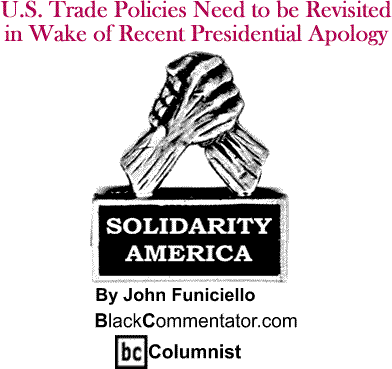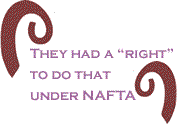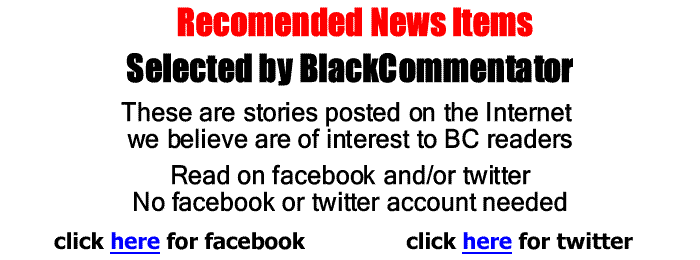
|
||||||||||||||||||||||
|
||
 |
||
So,
former president Bill Clinton has apologized for advocating and
fighting for policies in world trade that brought
It�s nice to know that some public officials, even a former president, can express some remorse for past actions, but it would have been preferable for some thought first to have been given to the effects of such far-reaching actions. Not much would have been required. Clinton and others only talked to people just like themselves, Republicans and Democrats, in planning the new wave of global trade. They called it �free trade.� Rank-and-file workers were talking about the effects of this free trade and they were predicting two or three decades ago what the effects would be. They witnessed their shop machinery and their jobs being shipped out to low-wage countries. They knew instinctively what was going to happen. It was a clear case of cause and effect: you take our jobs and our plant and we�re going to be a poorer nation and our children will suffer. But nobody asked them. As it took a Nixon to go to
The free trade that the two parties gave the American people was presented as if there never had been trade and it had to be sold to the people. Any cursory study of world history shows that there always has been trade - as long as someone could fashion a canoe or put a load on a horse or camel. The only thing that they didn�t teach was that he who has the biggest guns sets the terms of trade. Our modern version of trade didn�t need too many guns to set favorable conditions for the transnational corporations. This time, there were global institutions that had been in operation for a long time that could be used to get foreign heads of state to agree to the terms set by the world�s most powerful countries and their surrogates, the corporations. Through the free trade agreements of the past 30 or so years, we have come to our current financial state: nearly broke, with two or more wars that we are conducting on credit. When the North American Free
Trade Agreement (NAFTA) was only a year old, Within the past dozen years,
many Mexican small-scale chicken farmers were wiped out when Then, the right wing and the Republicans and some Democrats complained because Mexicans and others were entering the country without documentation to find work. Who wouldn�t, if your livelihood was wiped out by commercial fiat? The seemingly minor chicken incident was just the tip of the iceberg in the kinds of effects NAFTA had on the working people of the three countries. Other trade agreements of the past 30 years have done similar things to the people in various sectors of the economies of developing countries. Bill Clinton during his presidency
also opened When American workers looked out and saw their livelihoods being shipped out, they knew they weren�t coming back. When you (and these are current averages) are earning $29.98 an hour as a factory worker and see products in American stores made by Chinese factory workers who earn an average of 87 cents an hour, you know American industry will never be able to compete with that kind of disparity in production costs. This is what �free trade� agreements
have brought and the
Now that Often, Corporate America and its politicians deal with American workers in the same manner they deal with workers of other countries - low wages, no benefits, retire in penury. And, don�t get sick or injured. There are at least a few �developed�
countries that protect their citizens from a low standard of living.
American politicians call that �protectionism.� The other countries
call it common sense, and, because of that, there is not the disparity
in wealth that the
During the recent year-long debate (nasty argument, really) on health care reform, it was noted that, without universal care, some 45,000 Americans die prematurely every year. Think of the millions dying every year, slowly, of hunger and the disease of poverty around the world because of the policies of transnational corporations and the governments that give them permission to carry out those policies. It�s good that When A. Philip Randolph, founder of the Brotherhood of Sleeping Car Porters, one of the greatest and most courageous union leaders in American labor history, sought relief from President Franklin D. Roosevelt, from rampant discrimination against black workers in the defense industries before World War II, the president reportedly said, �I agree with you�now make me do it.�
BlackCommentator.com
Columnist, John Funiciello, is a labor organizer and former union
organizer. His union work started when he became a local president
of The Newspaper Guild in the early 1970s. He was a reporter for
14 years for newspapers in |
||
|
||
If you would like to comment on this article, please do so below. There is a 400 character limit. You do not need a FaceBook account. Your comment will be posted here on BC instantly. Thanks. Entering your email address is not mandatory. You may also choose to enter only your first name and your location.
|
||
Thank you very much for your readership. |
||
| Any BlackCommentator.com article may be re-printed so long as it is re-printed in its entirety and full credit given to the author and www.BlackCommentator.com. If the re-print is on the Internet we additionally request a link back to the original piece on our Website. | ||
| |
||
April 1, 2010 |
| Executive Editor: David A. Love, JD |
| Managing Editor: Nancy Littlefield |
| Publisher: Peter Gamble |
| Est. April 5, 2002 |
| Printer Friendly Version in resizeable plain text format |
 |
 |
 |

|
 |
| |
| |

































 In
any case, both Democrats and Republicans were happy about the trade
deals that continue to be negotiated today.
In
any case, both Democrats and Republicans were happy about the trade
deals that continue to be negotiated today. It
makes little difference whether a country is developed or �developing,�
like
It
makes little difference whether a country is developed or �developing,�
like  Left
to their own devices, members of Congress and the state legislatures
are not going to change direction. Rather, they have to be guided
by a people�s movement, and it is possible for the people to lead.
The structure for it is in the U.S. Constitution.
Left
to their own devices, members of Congress and the state legislatures
are not going to change direction. Rather, they have to be guided
by a people�s movement, and it is possible for the people to lead.
The structure for it is in the U.S. Constitution.









